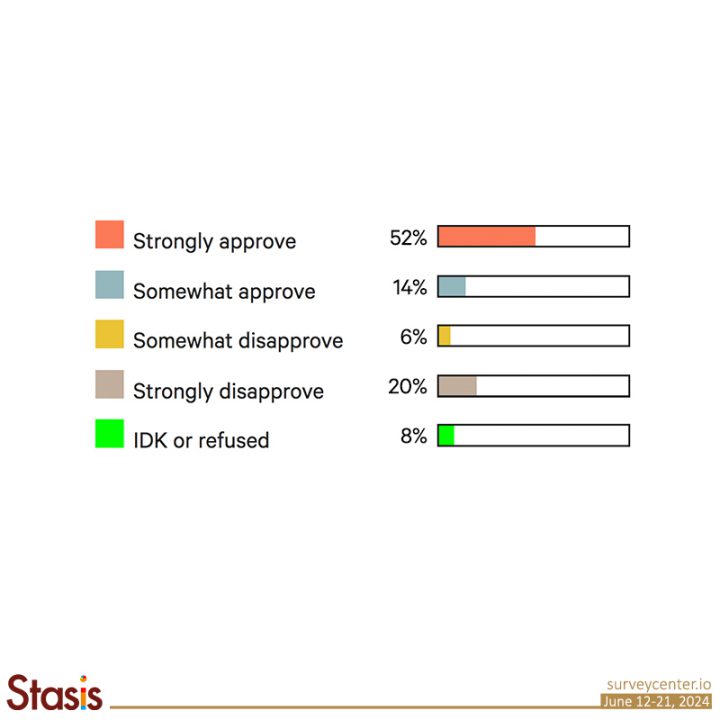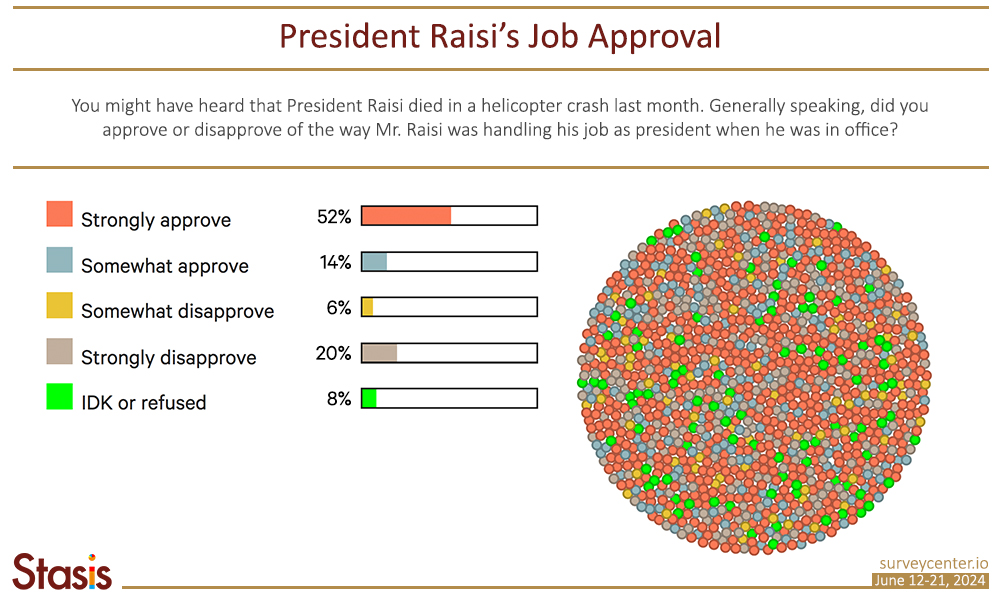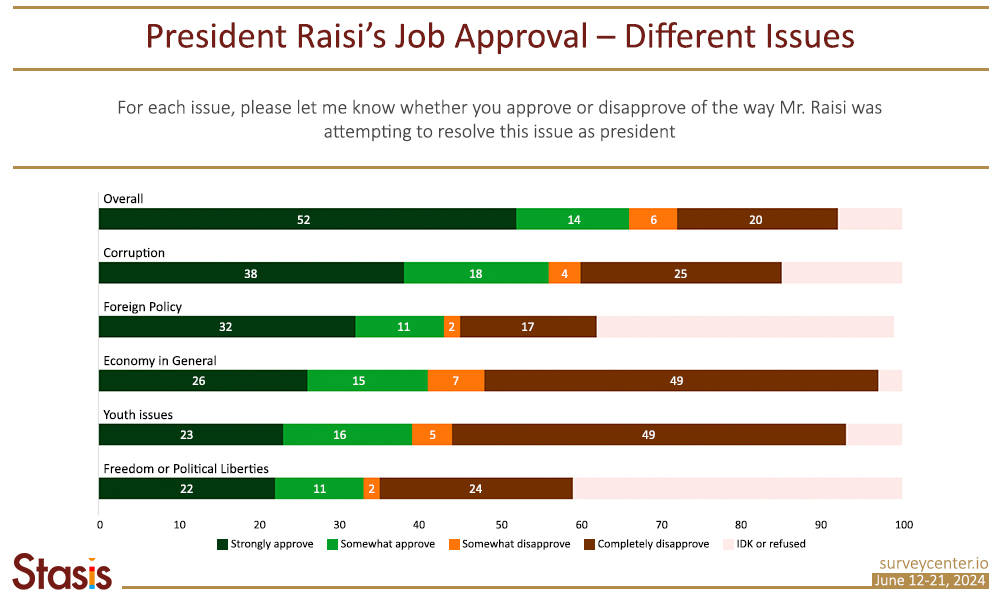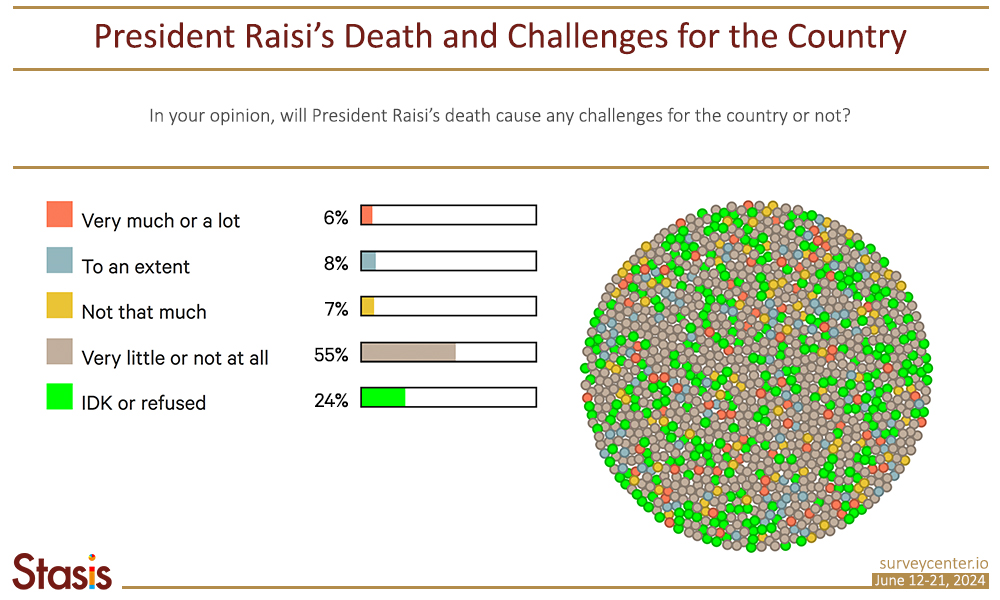
Iranians have contradictory view of President Raisi’s Performance
Iranians are conflicted about President Raisi’s performance after his tragic death in May. In every survey conducted by Stasis since President Raisi took office, Iranians have shown overall disapproval of his performance. Just three months earlier, only 32 percent of Iranians expressed approval of Raisi’s performance as president (link). However, in new survey conducted by Stasis Consulting, 66 percent approve of his overall job performance, as opposed to only 26 percent who disapprove. The approval of the Iranian president’s job performance over time has been visualized in this link.
These findings are based on a representative poll conducted by Stasis Consulting between June 12 and June 21, 2024, among 1,223 respondents aged 18 and older living in Iran.
President Raisi’s approval is High at 64%
The result of this survey indicate an overall approval of Mr. Raisi as president of the Islamic Republic during a time he was in office. Sixty-six percent of Iranians approve of his job performance while just 26% disapprove of it.

President Raisi’s approval across different issues
In this survey, we further investigated President Raisi’s approval rating across different issues, such as the economy, youth concerns, foreign policy, dealing with corruption, and freedom or political liberties. Although his overall job approval is posthumously high, Iranians have relatively lower opinions of his performance on specific issues. Among the top five issues, Raisi only achieved majority approval for his handling of corruption. Fifty-six percent of respondents approve of Raisi’s approach to corruption, followed by foreign policy (43 percent), the economy in general (41 percent), youth issues (39 percent), and freedom or political liberties (33 percent). Moreover, 56 percent of respondents disapprove of his performance on the economy in general and 54 percent disapprove of his approach to youth issues.

Iranians do not see Raisi’s death causing any challenges for the country.
Just 14 percent of Iranians say President Raisi’s death will cause challenges for the country, as opposed to 62 percent who have a different view, including 55 percent of respondents to this survey who believe his death will cause very little or no challenge for the country. Respondents with a college education (n=368) and those who live in urban areas (n=959) are more likely to say that the president’s death will not cause many or will cause no challenges for the country, with 71 percent and 62 percent, respectively.

Remarks
The results of this poll have been interactively visualized in this link. This is an interactive platform detailing the results of every question, distinguished in a bar chart by gender, age group, location, and education.
For each question, there is also a bubble chart (consisting of many small circles), detailing the respondents’ information. Each circle represents a single respondent; clicking on any given circle will generate the complete answer set for that particular respondent. The color coding is consistent between the bubble chart and bar chart for easy comparison.
Methodology
Survey methodology explained below:
- Telephone interviews were conducted between June 1221, 2024, among 1,223 respondents aged 18 and older living in Iran. Native Farsi speakers conducted the interviews during daytime hours.
- The proportional two-stage sample includes respondents from every province. Provinces have been sampled based on their population.
- Results are weighted by gender, age, location (urban vs. rural areas), and adjusted for Tehran’s province based on the Iranian national census of 2016, the 2018 statistical yearbook, and Iran’s Statistical Center demographic predictions for the year 2024.
- Based on the sample, there is a 95 percent confidence that the margin of sampling error is within ±2.8 percentage points.
- Rates of respondent candor and reliability were appraised by experienced interviewers. Fifty-eight persons found to be lacking in these areas were removed from the sample and are not included in the final sample or in this report.
- The response rate for this survey was 32.3%.
- This poll was carried out by Stasis in association with the Middle East Institute.